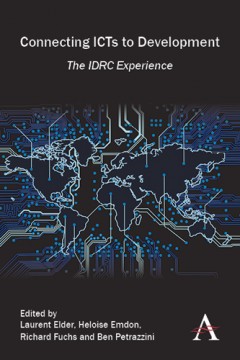Connecting ICTs to Development
The IDRC Experience
Edited by Heloise Emdon
Laurent Elder
Ben Petrazzini
Richard Fuchs
- About This Book
- Reviews
- Author Information
- Series
- Table of Contents
- Links
- Podcasts
About This Book
Digital technologies are an indispensable facet of every aspect of our society. Even in the developing world, mobile phones have transformed the lives and livelihoods of average citizens. Yet, two decades ago, when there were more phone lines in Manhattan than in most of Sub-Saharan Africa, only a few visionary institutions could have imagined that computers, the Internet and mobile phones would be so prominent in poverty-stricken environments. One of these visionary institutions was the International Development Research Centre (IDRC), which recognized the important but complex role that information and communication technologies (ICTs) would have in fostering human development and reducing poverty. IDRC-supported projects critically examined the ways in which ICTs could be used to improve learning, empower the disenfranchised, generate income opportunities for the poor, and facilitate access to healthcare in Africa, Asia, Latin America and the Caribbean. Their research focused on development priorities that were defined in collaboration with researchers from the Global South, civil society organizations, government officials and policymakers. By supporting research in this field since 1996, IDRC has become one of the leading institutions and key contributors to the growth of the “ICTs for development” (ICT4D) field, specifically because of its strategic decision to focus on building the capacity of Southern researchers and policymakers to explore how ICTs can continue to change people’s lives in the developing world.
Considering that most development institutions and governments are currently attempting to integrate ICTs into their practices, this is an opportune time to reflect on the research findings that have emerged from working alongside researchers in this area. In particular, this book examines how research has helped IDRC contribute to building the ICT4D field based on a nuanced understanding of the relationship between ICTs and development goals. It also discusses programmatic investments made by IDRC since the late 1990s in a wide variety of areas related to ICTs, including infrastructure, access, regulations, health, governance, education, livelihoods, social inclusion, technical innovation, intellectual property rights and evaluation.
Each chapter in this book analyzes how the research findings from IDRC-supported projects have contributed to an evolution of thinking, and the successes and challenges in using ICTs as a tool to address development issues. Each chapter also presents key lessons learned from ICT4D programming and makes recommendations for future work. The book illustrates how IDRC’s focus shifted over time from looking specifically at issues of access to understanding the implications of ICTs in the lives of citizens in the developing world.
Reviews
Author Information
Laurent Elder is the program leader of the Information and Networks program at IDRC in Ottawa, Canada.
Heloise Emdon is manager of international projects at Carleton University, Ottawa, Canada.
Richard Fuchs is the founder and CEO of Futureworks Consulting, Inc., Hantsport, Nova Scotia, Canada.
Ben Petrazzini is a senior program specialist in the Supporting Inclusive Growth program at IDRC, Ottawa, Canada.
Series
Table of Contents
Acknowledgments; INTRODUCTION PART I: From Heresy to Orthodoxy: ICT4D at IDRC – Richard Fuchs; INTRODUCTION PART II: From Beginning to End to Beginning Again – Katie Bryant, Laurent Elder, Heloise Emdon and Richard Fuchs; CHAPTER 1: Catalyzing Access through Social and Technical Innovation – John-Harmen Valk, Frank Tulus, Raymond Hyma and Florencio Ceballos; CHAPTER 2: Catalyzing Access via Telecommunications Policy and Regulatory Research – John-Harmen Valk and Khaled Fourati; CHAPTER 3: Access to Knowledge as a New Paradigm for Research on ICTs and Intellectual Property – Jeremy de Beer and Sara Bannerman; CHAPTER 4: ICTs and Social Inclusion – Chaitali Sinha and Raymond Hyma; CHAPTER 5: Access and Usage of ICTs by the Poor (Part I) – Kathleen Diga; CHAPTER 6: Local Economic Opportunities and ICTs: How ICTs Affect Livelihoods (Part II) – Kathleen Diga; CHAPTER 7: Research on eHealth across Health Systems: Contributions to Strengthen a Field – Chaitali Sinha and Dominique Garro-Strauss; CHAPTER 8: Making the Grade: The Role of ICTs in Providing Access to Knowledge – Ahmed T. Rashid, Alioune Camara, Maria Ng and Alicia Richero; CHAPTER 9: E-Government for Development: ICTs in the Public Sector and the Evolving Citizen–Government Relationship – Tara Fischer, Matthew L. Smith and John-Harmen Valk; CHAPTER 10: Innovations in Evaluating ICT4D Research – Sarah Earl, Chaitali Sinha and Matthew L. Smith; CHAPTER 11: Conclusions: A Decade of Innovation that Matters – Richard Fuchs and Laurent Elder; EPILOGUE: Into the Future: New Opportunities and Threats in a Global Networked Society – Laurent Elder; Author Biographies
Links
Stay Updated
Information
Latest Tweets



